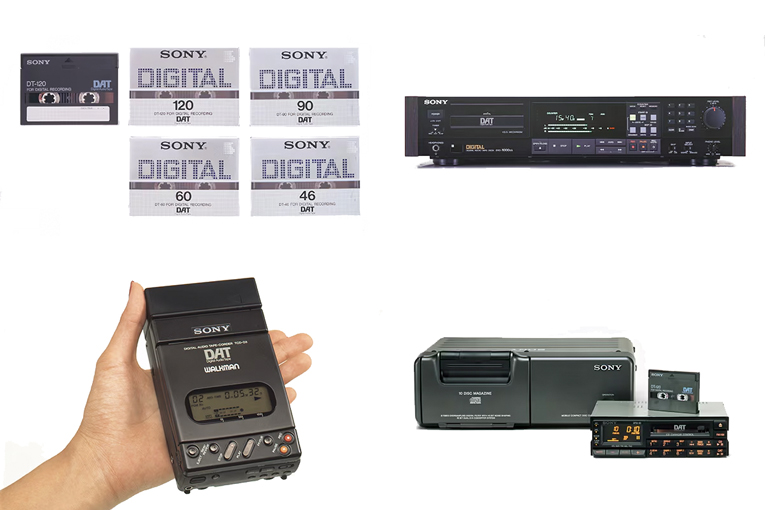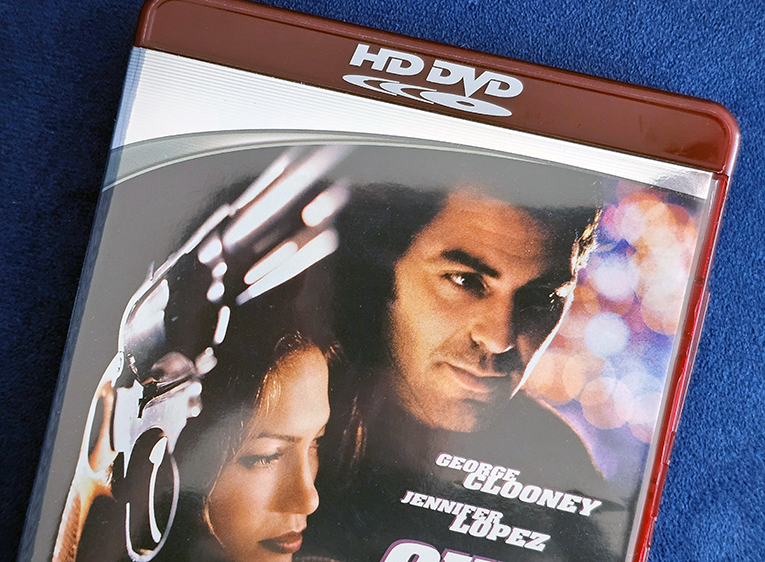Last month’s look at the return (kinda) of cassette sent me down a rabbit hole of old and forgotten formats. One stop on that adventure in format wonderland was the MiniDisc recorder review that also went live today. While MD holds a special place in my heart, it is by no means the only format that has been relegated to the attics, closets, and thrift shops of time.

The history of consumer electronics is littered with the corpses of promising formats, some of them former successes replaced by superior successors, others unpopular and unsuccessful attempts at being the next big thing. Some held real potential; others were obvious folly from the start to everyone but the designers. To be fair, sometimes they knew it was folly too.
A column like this could never hope to cover all former formats. So consider this a eulogy of sorts for a few recent-ish tech casualties, a word of caution against the permanence of all things electronic, even in the modern age.
DAT (Digital Audio Tape)
Around the same time as MiniDisc was the “competing” format of DAT. While ostensibly competitors, they ended up filling different niches. Smaller than a standard analog cassette, DAT used the same magnetic tape size. However, the recording and playback mechanism was more closely related to VHS and Betamax. DAT recorded uncompressed 16-bit digital audio with up to 48kHz sample rate on most hardware.

For professionals, DAT was a better option than MiniDisc, given its lack of compression. For consumers, MiniDisc was the better option since, unlike DAT, it wasn’t linear, so it was easier and faster to access different tracks.
While I had a MiniDisc recorder, my interaction with DAT was limited to the audio labs in college. I still have a few DATs, but I’d be surprised if they’re still playable. Sony discontinued the format in 2005.
DCC (Digital Compact Cassette)
Even less common than DAT was DCC, though both came from a similar development place and could be considered two related answers to the same problem. While DAT was CD-quality audio in a recordable tape format, the player/recorders were complex and expensive. DCC also stored digital audio on magnetic tape, but the mechanism to record and play the tapes was more closely related to the analog cassette. As such, the hardware was cheaper. To fit all the info on the magnetic tape, the audio was compressed using “Precision Adaptive Sub-Band Coding” (PASC). A version of this scheme was included in the initial MPEG standard, which later included another audio-compression method that was marginally successful: MP3.

Even though DCC hardware could play analog cassettes, the format wasn’t successful. No surprise given its inclusion on this list. My guess is regular cassette was “good enough” for people looking for something portable, but anyone interested in high fidelity was already switching to CD. By the time DCC hit the market, you could get a portable CD player with anti-skip buffering for a reasonable price. Panasonic and Philips discontinued their DCC recorders in 1996, only four years after their launch.
DivX
You’d be forgiven if you’ve forgotten DivX. You should forget DivX. Unlike the others in this list, DivX was more of a variation of a format than a format in itself. The brainchild of lawyers and Circuit City, DivX was a DVD-based rental format. Once played, the disc would only work for 48 hours. After that, you’d have to pay to rent again, or pay even more to unlock the disc permanently. DivX discs wouldn’t play in regular DVD players at all. This was the early days of DVD, and people rightly feared this was another format war. Pushback was fierce, not least because DivX was an obviously and atrociously offensive idea. Of course, DivX had wide studio support because money.

Guess what. I worked at Circuit City during DivX’s brief blight on consumer electronics. To say management wanted to push DivX hard would be an understatement. I don’t think there were quotas, but I wouldn’t be surprised if there were. I remember the DivX players paid better than regular DVD players (Circuit City paid commission on sales), but that might have just been because of how expensive the players were. Compared to a non-DivX player, they were often $100 more (nearly $200 more in today’s money), upwards of 30% more. So you paid a hefty premium for the privilege of renting a movie in a world where Blockbuster was everywhere. Literally, the only advantage was you didn’t have to return the disc. Or, theoretically, you could pay to re-watch a movie you’d already watched if you still had the disc.
At least the players, available from such brands as Panasonic, Proscan (RCA), and Zenith, were pretty good. They also continued working as standard DVD players when, less than a year after launch, DivX disappeared from the consumer landscape like the lead zeppelin everyone knew it was.
Oh, and the movies were only available in pan-and-scan format, something that infuriated film buffs (like me) and film-school snobs (also me).
HD DVD
HD DVD is probably not “forgotten” the way that the others on this list may be. I’m guessing it’s within living memory for most readers. It is the first “format war” that I covered, and I covered it extensively during my tenure at Home Theater magazine. While it eventually lost out to Blu-ray in a way that, in hindsight, seems inevitable, there was one way it was absolutely superior: when you put the disc in the player, the movie would just start. You could open a disc menu if you wanted, but the movie just starting was so much better. Clearly this wasn’t enough to win.

You could argue that Toshiba never recovered from HD DVD, at least not its consumer electronics side. Launching a new format is always a gamble. Sony, Panasonic, Philips, and others have all made this gamble and either won or lost big. The bigger the play, the bigger the potential loss. This is probably why there was essentially no competitor to 4K Blu-ray. Better for everyone to just jump on board the same ship and make the safe money.
It’s certainly possible we’ll never have another format war, since formats have largely disappeared. Everything is either streamed or downloaded, locked behind bespoke encryption. So, really, another way to look at it is there was a final format war, and we lost. We don’t have ownership of anything streamed or even some things downloaded. It’s not ours to enjoy forever; we just lease it with a subscription. Hmm, maybe bringing back cassette isn’t a bad idea.
. . . Geoffrey Morrison





